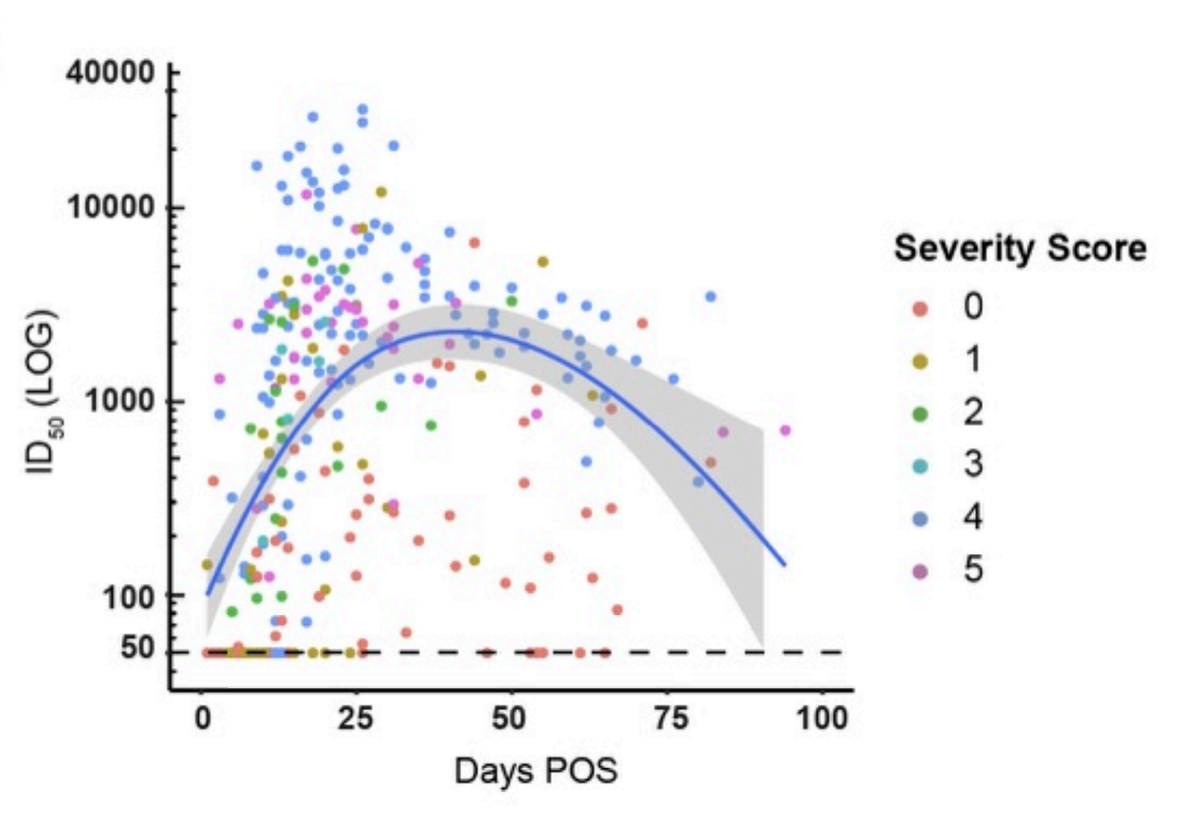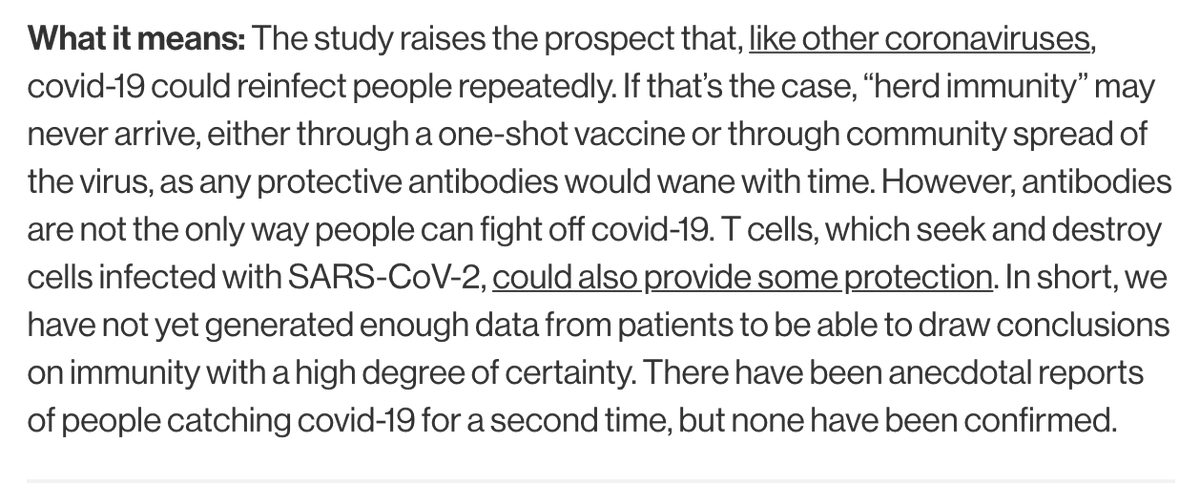The media are, rightly, taking a lot of heat for spreading false fears about COVID-19 immunity. But& #39;s its worth tracing the origins of this particular case back to where it starts. https://twitter.com/CT_Bergstrom/status/1284520081930637314">https://twitter.com/CT_Bergst...
The article that prompted this discussion was pegged to a @medrxivpreprint paper from researchers at King& #39;s College who monitored neutralizing antibodies to COVID-19 in 65 patient in the three months following symptom onset. https://www.medrxiv.org/content/10.1101/2020.07.09.20148429v1">https://www.medrxiv.org/content/1...
The raw data are pretty simple. Most of the people in the study (95%) produced a high titer of neutralizing antibodies, with the titer declining after a peak around 21 days post onset of symptoms, with a lot of inter-individual variation in magnitude of response and kinetics.
The authors interpret their work as a piece of cautionary data for antibody testing, the duration of protective immunity after infection, and the potential effectiveness of vaccines designed to elicit a neutralizing antibody response.
However, they are appropriately cautious on what the implications of these data are, and discuss the study in light of other data that paints a more optimistic picture. There& #39;s not a lot of discussion of other types of immunity, but this isn& #39;t a review article so that& #39;s ok to me.
The press release from King& #39;s College was, atypically, quite restrained - more or less repeating the results of the paper and striking an equally cautious note. But here, perhaps, the lack of context becomes a problem because of what follows https://www.kcl.ac.uk/news/covid-19-antibodies-decline-over-time">https://www.kcl.ac.uk/news/covi...
On the day the press release came out, there were several news stories about the paper. One of the most prominent was from @techreview. The summary of the study is fine. But read the "What it means" section. https://www.technologyreview.com/2020/07/13/1005103/immunity-to-covid-19-could-disappear-in-months-a-new-study-suggests/">https://www.technologyreview.com/2020/07/1...
It& #39;s a huge, and in context irresponsible, leap to go from the results of this study to the idea that vaccines and herd immunity won& #39;t stop the virus. It& #39;s not that this isn& #39;t a possibility- the problem is the idea that there is now real scientific evidence to support this worry.
Almost immediately you started seeing the article retweeted like this: https://twitter.com/DR_Fred_Davies/status/1282651602994814977?s=20">https://twitter.com/DR_Fred_D...
Putting the politics aside, people read the @techreview article as saying that science has shown that herd immunity is a fantasy and started to cite it this way. And it is being cited ALL over the place as PROOF that vaccination and herd immunity won& #39;t work.
This is of course a complete misrepresentation of the work - something that the paper and the press release did not evoke (there are almost no direct references to the paper or press release making this point). This one is all on the media.
And it& #39;s hardly only @techreview. A story from @CNBC takes it a step further - linking this paper to a study in the Lancet that (without a link to the actual paper) that they claimed showed herd immunity would not work https://www.cnbc.com/2020/07/14/immunity-to-covid-19-uk-study.html">https://www.cnbc.com/2020/07/1...
But this citation is completely bogus. The Lancet that surveyed seroprevalence levels in Spain - it& #39;s point was NOT that herd immunity wouldn& #39;t work for some immunological reason - but that too few people were infected for it to be relevant now. https://www.thelancet.com/journals/lancet/article/PIIS0140-6736(20)31483-5/fulltext">https://www.thelancet.com/journals/...
Like the @techreview piece this @CNBC article is being cited all over the place as evidence that vaccination and herd immunity won& #39;t work.
I get why these stories are written: a study comes out showing something potentially interesting that, taken in isolation, might have huge implication. The leaps they make aren& #39;t crazy - they are, just like much science reporting, highly speculative and decontextualized.
There is a lot of context missing: that antibody levels always spike and then decline, that even at low levels they can provide protection, that there are many other ways immunity can be mediated, and that there& #39;s good evidence that suggests vaccines and herd immunity will work.
And the most important context that these stories are missing is the context in which they are published. The media have to know both that people are desperate for information on COVID, and that every bit of information is immediately personalized and politicized.
In such a context, the media have to be much much much more careful about how they report on individual studies. That& #39;s not to say they shouldn& #39;t report on them - but now is the time for the media to fix the way it reports on science.
The oft criticized tendency of the media to treat scientific studies as discrete pieces of news rather than pieces of a much bigger picture - while always a problem - is in the context of COVID a bona fide public health threat.
But while the media are culpable and need to change the way they report on science - the responsibility for this kind of distortion of science ultimately lies with scientists.
It& #39;s not that the work is bad - quite the opposite - this is incredibly important work and there will be more such studies that will give us a much clearer picture of COVID immunity. And, as I said above, the paper itself was carefully worded.
But it was a huge mistake to put out a press release. Even though it was also carefully worded, the researchers and press office had to know how the work would be interpreted and spun. By putting out a press release they encouraged it to be treated as news.
If we as scientists want individual stories not to be treated as decontextualized pieces of news, we need to stop treating them as such. We need to do our science, report on it openly and honestly, but not run to the media every time we have a new piece in a much bigger picture.
I want to finish by highlighting the fact that there are a huge cadre of really amazing journalists out there who are trying to report on COVID in thorough, nuanced and comprehensive way. Unfortunately, their voices are all too often drowned out.
Scientists have a huge role to play in supporting responsible science journalism by not encouraging and empowering quick-hit, clickbaity stories about science that isn& #39;t really news.

 Read on Twitter
Read on Twitter



